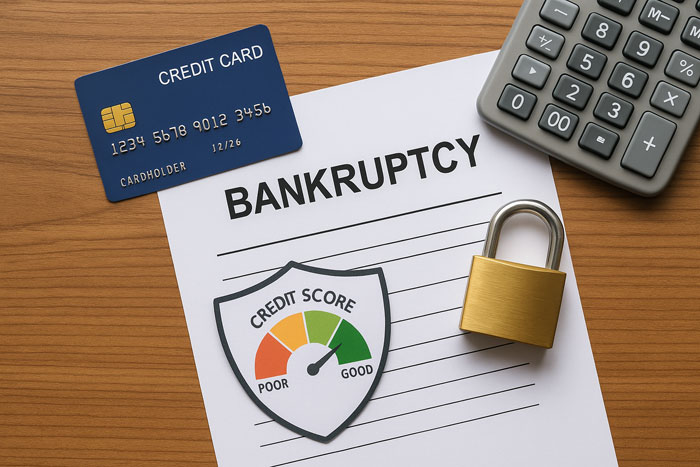Planning Ahead: How to Protect Your Credit While Exploring Bankruptcy Options
Filed under: bankruptcy

If you’re reading this, chances are you or someone you know is facing serious financial pressure—and turning to bankruptcy may feel like the only viable option. At Baker & Associates, we recognize that bankruptcy is a major decision, but it doesn’t have to mark the end of your credit future—it can be the beginning of a new one.
In this post, we’ll walk you through proactive steps you can take now to protect and rebuild your credit, whether you ultimately decide to file or pursue alternative solutions.
1. Understand the “automatic stay,” then act strategically
Once you file under either Chapter 7 or Chapter 13, an automatic stay goes into effect—creditors must halt collection efforts, wage garnishment, repossessions, and foreclosures.
This breathing room is one of the most powerful protections bankruptcy provides. But while that relief is in place, you also want to be careful about what you do with credit, loans, and major purchases. Unnecessary new obligations may complicate your case or negatively impact your post-bankruptcy credit rebuilding.
Tips while you’re assessing your situation:
-
Avoid opening new lines of credit or making big purchases on credit that you may not be able to repay.
-
If you’re considering secured debt (like a car loan), discuss with us how it may affect your case or your discharge.
-
Continue making essential payments (housing, utilities, car payments) unless we direct otherwise—your filings will reflect your overall financial footprint.
2. Prioritize rebuilding your credit — even before your case ends
Contrary to common belief, filing bankruptcy does not mean you can never rebuild. In fact, many clients at Baker & Associates begin the process of credit rebuilding while their case is still pending. The key is to adopt a disciplined approach.
Here’s a roadmap:
-
Get the basics right: After your case ends, request your free credit reports and review them for accuracy. Correct any mis-reporting.
-
Use a secured credit card wisely: Once discharge is complete (or sometimes even while you’re in a Chapter 13 plan) you may obtain a secured credit card. Use it for a small expense, pay it off in full and on time, and avoid carrying balances.
-
Keep older accounts open: If you have existing accounts in good standing that won’t hinder your case, leaving them open helps your credit length-of-history metric.
-
Avoid multiple hard inquiries: Each credit application usually triggers a hard pull. Limit new credit applications unless necessary and discussed with us.
-
Monitor your credit utilization: Try to keep your balances below 30% of your credit limits. This shows healthy credit behavior.
3. Know what to expect from credit scores after bankruptcy
It’s normal to worry about how your credit score will fare after bankruptcy. Here are some practical pointers:
-
A bankruptcy filing will likely cause a significant drop in your credit score immediately. That’s part of the process.
-
But many clients begin to see meaningful improvement within a year or two if they adopt good habits and avoid new major missteps.
-
Some lenders offer “fresh start” credit products designed for post-bankruptcy consumers (secured cards, small personal loans). These help rebuild the “payment on time” history that matters most.
At Baker & Associates, we often remind clients that credit is not just about what happened in the past—it’s about what you do going forward. A strategic, disciplined approach will set you up for recovery.
4. If you’re a small business owner: credit rebuilding after business bankruptcy
If you file under Chapter 11 or a small business in Chapter 7/13, there are extra wrinkles when it comes to credit and separation of personal vs. business liability. Consider these business-specific steps:
-
Document the business’s shutdown or reorganization clearly—avoid commingling personal and business funds.
-
If the business is restructured, keep personal credit separate from business obligations.
-
After your case concludes, apply for a small business starter line of credit or business-use credit card using the fresh start narrative (and your attorney recommendation letter, if applicable).
-
Maintain accurate bookkeeping and demonstrate consistent payroll/expense behavior—creditors and vendors often review business practices before extending credit.
5. Why consulting with Baker & Associates early gives you credit benefit
One of the smartest moves you can make is contacting us before your financial picture becomes unmanageable. Here’s why:
-
We can evaluate whether bankruptcy is the best solution — or whether alternatives (debt settlement, negotiation, debt-management plans) are viable and credit-friendly.
-
If bankruptcy is needed, early involvement gives us more time to strategize your asset exemptions, future income, and how your case will be perceived by future lenders.
-
We help you plan the credit-rebuilding portion of your exit strategy before you even file, so you don’t lose momentum the day your discharge is entered.
Call our Houston office
Facing overwhelming debt is stressful—but you don’t have to resign yourself to a ruined credit future. With the right timing, decision-making, and guidance from Baker & Associates, you can use the protections of bankruptcy (if needed) to turn a crisis into a fresh financial start.
Focus on protecting your credit now, adopt consistent rebuild habits afterwards, and stay aligned with your attorney’s strategy every step of the way.
If you’re worried about your credit, your debts, or whether bankruptcy is the right move, call our Houston office at (713) 979-2279 (or use our online evaluation) to schedule a consultation. Let us help you protect your rights, streamline the process, and rebuild stronger.
Disclaimer: This blog post is for general informational purposes only and does not constitute legal advice. Your specific situation may vary. Please consult with an attorney at Baker & Associates to discuss your particular case.

